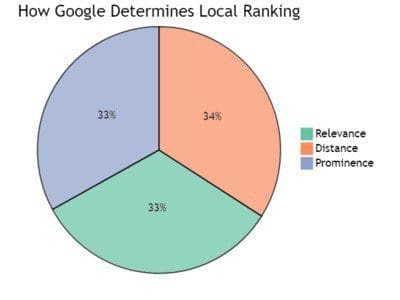Improve Your Local Ranking: Local SEO Tips for Small Businesses
In today’s digital world, it’s more important than ever for local businesses to be easily found by their customers online. This is where Search Engine Optimization for Local Businesses comes in. In this comprehensive guide to improve your local SEO, discuss its benefits, and delve into the challenges businesses face. We’ll also provide strategies and tips that you can implement to raise your local search ranking, making it easier for potential customers to find your business online.

Understand local optimization vocab.
Background Information
Before we dive into the world of local SEO, let’s define some key terms to ensure we’re all on the same page:
- Local SEO: The process of optimizing your online presence to attract more local buyers and increase your search visibility for location-specific searches.
- Local search: A search performed by users with the intent of finding local businesses, products, or services.
- Local business: A business that serves customers in a specific geographic area.
- Search engines: Online tools (e.g., Google, Bing, Yahoo) that help users find information by searching the web.
- Google My Business: A free service offered by Google that allows businesses to manage their online presence, including their business profile and appearance in search results.
- SEO strategy: A plan of action designed to improve your website’s visibility and ranking on search pages.
Now that we’ve defined some key terms, let’s briefly discuss the evolution of local SEO and its significance in today’s digital age. In the past, people relied on phone books or word of mouth to find local businesses. However, with the rise of the internet and the increasing use of smartphones, people now turn to search platforms to find businesses near them. This shift in consumer behavior has made local SEO an essential tool for businesses looking to connect with customers and grow their online presence.
Benefits of Local SEO

A business owner meets with his team to discuss local SERP positions.
Local SEO offers several advantages for businesses, including:
- Attracting more local clients: By optimizing your online presence for local search, you can make it easier for potential customers in your area to find your business.
- Increased search visibility: Local SEO helps your business appear higher in search results, making it more likely that users will click on your website or business listing.
- Ranking higher on organic search results: Organic search results are listings that appear in search pages based on their relevance to the user’s search query. By enhancing your local SEO, you can increase your chances of appearing higher on organic search results, driving more traffic to your website.
Challenges of Local SEO
While local SEO offers many benefits, it also comes with its fair share of challenges, such as:
- Fierce competition: With so many businesses vying for the top spots in local search results, it can be difficult to stand out from the crowd.
- Constantly evolving search algorithms: Search algorithms are continuously updated to provide users with the most relevant and accurate search results. This means that businesses need to stay up-to-date on the latest trends and best practices in local SEO to maintain their search ranking.
- Ongoing optimization efforts: Successful local SEO requires constant monitoring and optimization to ensure your online presence remains visible and relevant to your target audience.
Despite these challenges, there are practical solutions that businesses can adopt to overcome them, such as conducting regular local SEO audits, creating great local content, and earning local citations and backlinks.

Talk to local businesses to help boost your local SEO ranking.
Real-World Examples of Successful Local SEO
To demonstrate the power of local SEO, let’s take a look at a few examples of businesses that have successfully leveraged local SEO to improve their online presence and attract more customers.
Susan’s Boutique
Susan is a local business owner of a small boutique in her city that offers a unique selection of clothing and accessories. To reach more local shoppers, Susan decided to invest in local SEO. She optimized her Google My Business profile, added her business to local directories, and focused on creating engaging content for her website that highlighted local events and fashion trends. As a result, Susan’s Boutique started to rank in a higher position for searches in her local area, attracting more customers to her store and increasing her online visibility.
Mike’s Plumbing Services
Mike, a local plumber, noticed that his business wasn’t showing up in local results when potential customers searched for plumbing services in his area. To improve his local SEO, Mike claimed and optimized his Google Business Profile, included local key phrases on his website, and started collecting positive reviews from his customers. After implementing these strategies, Mike’s Plumbing Services began to rank higher in local searches, leading to an increase in customer inquiries and appointments.
These examples show that with the right local SEO strategies, businesses can significantly improve their online presence and attract more local customers.

For good search engine rankings, prioritize local intent.
How to Optimize Your Website for Local SEO
A crucial aspect of search results for local businesses is optimizing your website to make it more relevant and accessible to local searchers. Here are some steps you can take to optimize your website:
- Include local keywords: Incorporate relevant local keywords into your website’s content, title tags, and meta descriptions. This will help search platforms understand the geographic focus of your business and boost your rank locally.
- Create local content: Develop content that is relevant and valuable to your local audience, such as blog posts about local events, news, or industry trends. This will help establish your business as an authority in your area and attract more local visitors to your website.
- Optimize your contact page: Make sure your contact page includes your business name, address, and phone number (NAP) in a consistent format. This information should also be displayed prominently on other pages of your website.
- Add schema markup: Schema markup is a type of structured data that helps spiders better understand the content of your website. Adding schema markup for local businesses can help enhance your ranking on local search and make your business more visible in the local SERP.
How to Identify Local Keywords
Local keywords are specific phrases that potential customers in your area might use when searching for your products or services. Identifying and targeting these keywords is an essential part of local search. Here are some tips to help you identify appropriate keywords:
- Think like your customers: Put yourself in your customers’ shoes and think about the phrases they might use to find businesses like yours in their area. For example, if you own a bakery in San Francisco, potential customers might search for “San Francisco bakery” or “best pastries in San Francisco.”
- Use keyword research tools: Tools like Google Keyword Planner, Moz Keyword Explorer, and SEMrush can help you identify popular local keyphrases related to your business. These tools can also provide insights into search volume and competition, helping you prioritize your target keywords.
- Analyze your competitors: Research your local competitors and identify the keywords they are targeting in their website content, title tags, and meta descriptions. This can give you ideas for additional keywords to target and help you understand the competitive landscape in your area.
Invest in Google Ads with Local Keyphrases

Using Google Ads will help your SEO ranking.
Google Ads is a powerful advertising platform that allows you to create targeted ads based on keyphrases and geographic location. By investing in Google Ads with local keyphrases, you can increase your online visibility and attract more local buyers. Here are some tips for using Google Ads effectively for local searches:
- Set up location targeting: When creating your Google Ads campaigns, be sure to target the specific geographic areas where your potential customers are located. This will help ensure your ads are only shown to users who are likely to be interested in your products or services.
- Use local keyphrases in your ads: Incorporate your locally identified keywords into your ad copy, headlines, and display URLs. This will make your ads more relevant to searchers in your area and improve your ad’s click-through rate.
- Create ad extensions: Ad extensions provide additional details about your business, such as your address, phone number, and business hours. Using ad extensions can make your ads more appealing to people searching your local area and increase the chances of them clicking on your ad.
- Track your ad performance: Monitor the performance of your Google Ads campaigns by tracking key metrics like clicks, impressions, click-through rate, and conversions. This will help you identify which keywords and ad strategies are most effective and allow you to optimize your campaigns accordingly.
Local Citations: Name, Address, Phone (N.A.P.)
Citations are online mentions of your business’s name, address, and phone number (N.A.P.). These citations play a crucial role to boost your local SEO because they help search engines verify the accuracy and consistency of your business information. Here’s how to manage them effectively:
- Claim and optimize your Google My Business profile: Your Google Business Profile is a significant citation source. Be sure to claim and optimize your profile by adding accurate and up-to-date information about your business.
- List your business on local directories: Add your business to popular local directories and review sites like Yelp, Foursquare, and TripAdvisor. This will help increase your online visibility and provide additional citation sources.
- Consistency is key: Ensure that your business’s N.A.P information is consistent across all online platforms, including your website, social media profiles, and local directories. Inconsistencies in your N.A.P. information can confuse search engines and harm your ranking.
- Monitor your citations: Regularly review your citations to ensure the information is accurate and up-to-date. Tools like Moz Local and BrightLocal can help you track and manage your citations more efficiently.

This gives an idea of Google’s local search algorithm
How Google Determines Local Ranking
Google uses various factors to determine local search position, including:
- Relevance: How well your business listing matches the user’s search query. To improve your relevance, ensure your Google My Business profile contains accurate and detailed info about your business.
- Distance: The proximity of your business to the searcher’s location. Although you can’t control this factor, enhancing your SEO for local can help improve your visibility in searches from users in your target area.
- Prominence: The overall popularity and reputation of your business, both online and offline. To increase your prominence, focus on earning positive reviews, creating high-quality content, and building local backlinks.
With a good understanding of how local positions are determined by Google, you can tailor your local search efforts to address these factors and improve your search visibility.
Conclusion
Local SEO is an essential tool for businesses looking to connect with local shoppers and grow their online presence. By understanding the benefits and challenges of local-focused SEO, implementing effective strategies like optimizing your website, identifying a list of local keywords, investing in Google Ads, managing citations, and understanding how Google determines local position, you can improve your local ranking and attract more customers to your business.
If you have any questions or need additional local SEO tips, please don’t hesitate to reach out. We’re here to help you succeed in your local marketing efforts and stay ahead of the competition.
Frequently Asked Questions

Your on-page SEO should be focused on local search intent.
To help you better understand local SEO and its importance for your business, here are five questions and answers that were not covered in the main body of the article.
1. How long does it take to see results from local SEO endeavors?
The time it takes to see results from local SEO endeavors varies depending on factors such as your starting point, competition, and the strategies you implement. In general, it may take anywhere from a few weeks to several months to see noticeable improvements in your local area results. Remember that local SEO is an ongoing process, and maintaining your efforts over time is crucial for long-term success.
2. How can I encourage customers to leave reviews for my business?
Encouraging customers to leave reviews can help improve your online reputation and prominence in local results. Some ways to encourage reviews include:
- Asking for reviews in person or via email after a successful transaction
- Adding a review link on your website or in your email signature
- Responding to existing reviews and engaging with customers
Remember to never offer incentives for reviews, as this can violate guidelines on most review platforms, including Google.
3. Can social media play a role in local SEO?
Yes, social media can play a role in local SEO by increasing your online visibility and helping you connect with your audience. Make sure your social media profiles include accurate N.A.P information and share content that is relevant and valuable to your local followers. Engaging with your audience on social media can also help improve your online reputation, which can influence your prominence in searches.
4. Are there any practices that I should avoid?
It’s essential to avoid engaging in any tactics that violate search guidelines, as these can harm your search rankings locally and your online reputation. Some examples of practices to avoid include:
- Creating fake reviews or offering incentives for reviews
- Using inaccurate or misleading N.A.P information
- Participating in spammy or low-quality link-building schemes
Always focus on providing value to your local followers and observing search guidelines to achieve long-term success in local SEO.
5. How can I stay updated on the latest local SEO trends and best practices?
Local SEO is a constantly evolving field, and staying up to date on the latest trends and best practices can help you maintain a competitive edge. Some ways to stay informed include:
- Following industry blogs and websites
- Subscribing to newsletters from reputable SEO experts and companies
- Attending webinars, conferences, and networking events related to local SEO
By staying informed and continuously refining your local SEO strategies, you can ensure your business remains visible and attractive to your community.
Get in Touch for More Information
If you have any questions or need more resources related to local SEO, feel free to contact us. We’re here to help you succeed in your local SEO actions and stay ahead of your competition. Reach out to us for personalized advice, tips, and tools to boost your local search ranking and attract more customers to your business.

